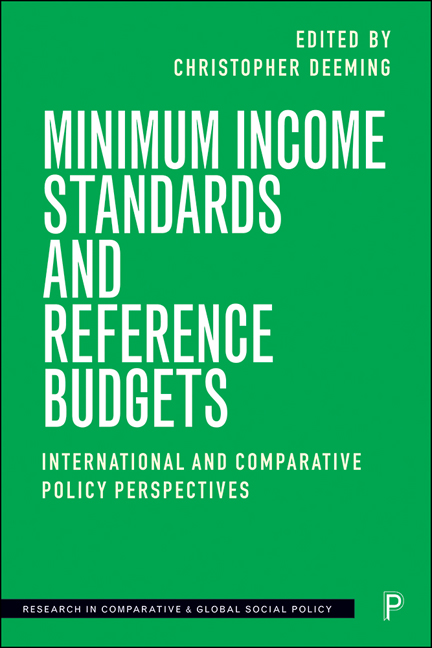3 - Minimum Essential Standards of Living Research in Ireland
Published online by Cambridge University Press: 12 March 2021
Summary
Introduction: origins and aims
The Vincentian Partnership for Social Justice (VPSJ) is a small community and voluntary organisation which was established in 1995 to work for social and economic change, tackling poverty and exclusion. To achieve its goal, the partnership uses two approaches: (1) the facilitation of an Active Citizenship Voter Education Programme and (2) the development of data on the cost of a Minimum Essential Standard of Living (MESL). The first focuses on communities in disadvantaged areas in which there is a low voter turnout. During the first five years of working in these communities, the VPSJ became increasingly conscious of the long-term effects of living with an inadequate income and the implications for standards of living, participation in society and access to education, health and social services. It was in the course of this work on active citizenship that a group of women became very interested in how the national income was distributed. It was in response to seeing the amount allocated to social welfare in the national budget and the wide range of people dependent on social welfare transfers that two of the women asked, “Will no one show the government what it is like to live on social welfare transfers and the national minimum wage?” “Will no one show them what people need to have to live on in order to have a decent standard of living, a life with dignity?” They went on to say, “The payments don't meet the cost of living even a very basic standard. They must be pulled from the air.” In response, the VPSJ began its work to develop data on the cost of a Minimum but Acceptable Standard of Living. As a result of developments in this area over many years, the VPSJ established the Minimum Essential Budget Standards Research Centre.
The VPSJ began the work on income adequacy by focusing on the first part of the women's plea. The question of adequacy was a crucial one for the VPSJ in its first attempt to explore the realities faced by households struggling to make ends meet.
- Type
- Chapter
- Information
- Minimum Income Standards and Reference BudgetsInternational and Comparative Policy Perspectives, pp. 39 - 54Publisher: Bristol University PressPrint publication year: 2020



